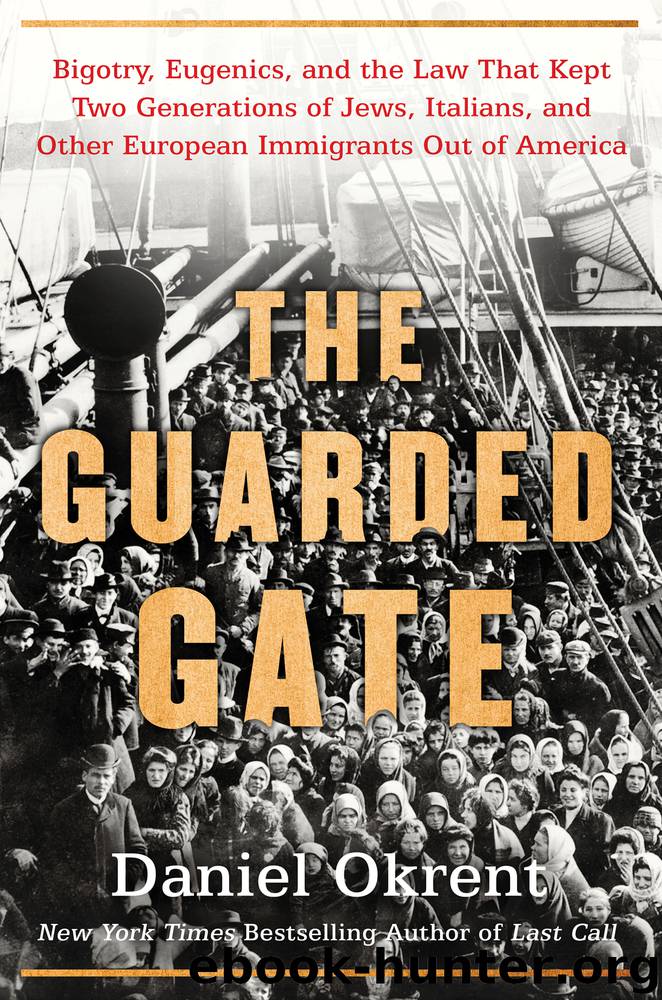The Guarded Gate by Daniel Okrent

Author:Daniel Okrent
Language: eng
Format: epub
Publisher: Scribner
* * *
Scribner’s was hardly alone in its promotion of scientific racism in the postwar, post–literacy test years. Throughout the culture, many saw all too clearly what the inarticulate Tom Buchanan perceived but was unable to describe. At the same time that Sinclair Lewis was satirizing the growing eugenics mania in Main Street (as he would again in Arrowsmith), Willa Cather was publishing stories portraying Jewish immigrants as almost subhuman.I Edgar Lee Masters, whose Spoon River Anthology had been a sensation in 1915, published “The Great Race Passes,” a poem setting Grant’s hypotheses to grotesque tropes that could have come straight from Thomas Bailey Aldrich’s “Unguarded Gates.” Masters begins by hailing “the Vikings who . . . / became the bone of England / And the fire of Normandy, / And the will of Holland and Germany, / And the builders of America.” Then he gets to his point:
On State Street throngs crowd and push,
Wriggle and writhe like maggots.
Their noses are flat,
Their faces are broad,
Their heads are like gourds,
Their eyes are dull,
Their mouths are open—
The Great Race is Passing.”
Grant was delighted by the poem, but a poem—even one by a writer as popular as Masters—was only a poem. Just as gratifying to Grant (and to Stoddard), and more effective in reaching the American public, were the words—tens of thousands of words, torrents of words, words as shiny and as slashing as a harpoon—that hailed their cause in the mighty pages of the nation’s foremost periodical, the Saturday Evening Post.
It is hard to overstate the dimensions of the Post’s influence in the 1920s. Television didn’t exist, radio was still an infant, newspapers were local. Among magazines, which were the nation’s only shared source of news, culture, and information, the Post, edited since 1899 by the courtly George Horace Lorimer, was preeminent both in circulation and in a sort of mass-market prestige. It published the most popular (and some of the finest) writers of the day, including Fitzgerald, Lewis, and Cather, as well as Ring Lardner, Theodore Dreiser, and Jack London. In 1916 Lorimer discovered a twenty-two-year-old illustrator named Norman Rockwell, whose covers for the magazine would fashion America’s fondest image of itself. The “Henry Ford of American literature,” as Lorimer was once called, was inarguably the nation’s most important editor.
By the time the United States entered World War I, Lorimer had ushered the magazine through nearly two decades of solid (if stolid) success. But the war and its aftermath struck Lorimer, as it had Lothrop Stoddard, with life-changing force. Formerly internationalist and moderate, Lorimer and his magazine jumped onto the nativism steamroller and then seized the controls. Unchecked immigration became his obsession, and his magazine became its most potent foe. Lorimer tipped his hand in a 1920 editorial titled “Self-Preservation,” where he wrote that “The rank-and-file of these assimilated aliens still live mentally in the ghetto or as peasants on the great estates.” At the time, this was garden-variety xenophobia. But the clue that the Post would become a hothouse for
Download
This site does not store any files on its server. We only index and link to content provided by other sites. Please contact the content providers to delete copyright contents if any and email us, we'll remove relevant links or contents immediately.
| Africa | Asia |
| Canadian | Europe |
| Holocaust | Latin America |
| Middle East | United States |
Fanny Burney by Claire Harman(25779)
Empire of the Sikhs by Patwant Singh(22166)
Out of India by Michael Foss(16310)
Leonardo da Vinci by Walter Isaacson(11897)
Small Great Things by Jodi Picoult(6087)
The Six Wives Of Henry VIII (WOMEN IN HISTORY) by Fraser Antonia(4785)
The Wind in My Hair by Masih Alinejad(4421)
The Lonely City by Olivia Laing(4113)
The Crown by Robert Lacey(4100)
A Higher Loyalty: Truth, Lies, and Leadership by James Comey(4027)
The Iron Duke by The Iron Duke(3637)
Millionaire: The Philanderer, Gambler, and Duelist Who Invented Modern Finance by Janet Gleeson(3566)
Sticky Fingers by Joe Hagan(3451)
Alive: The Story of the Andes Survivors by Piers Paul Read(3304)
Papillon (English) by Henri Charrière(3265)
Joan of Arc by Mary Gordon(3254)
Stalin by Stephen Kotkin(3082)
Aleister Crowley: The Biography by Tobias Churton(3016)
Ants Among Elephants by Sujatha Gidla(2922)
